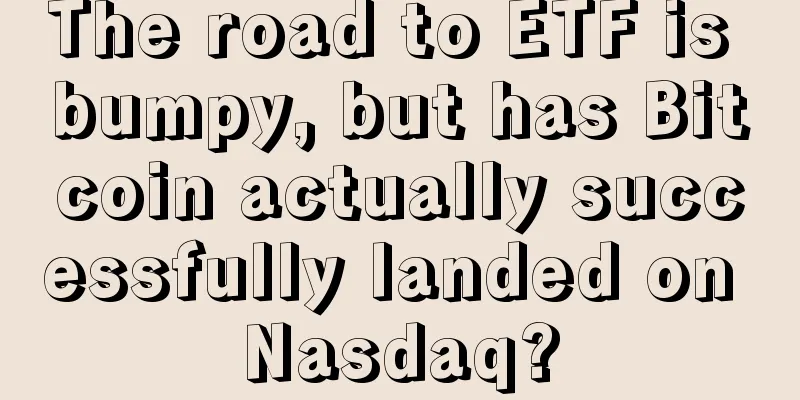The road to ETF is bumpy, but has Bitcoin actually successfully landed on Nasdaq?

|
On March 11, 2017, the U.S. Securities and Exchange Commission (SEC) rejected the application for the establishment of a Bitcoin exchange-traded fund (ETF), which dashed investors' hopes of expanding Bitcoin trading through ETFs. Affected by this news, Bitcoin on foreign trading platforms fell sharply by more than 16% that day. The price of Bitcoin fell from the highest point of $1,325.81 to $1,178.54 in 5 minutes, and later fell below the psychological barrier of $1,000, with a minimum of $978. The price of OKCoin, a domestic trading platform, was also affected. On March 11, the opening price of OKCoin was around 8,000 yuan, and the lowest price on that day was 7,317 yuan, a drop of 9%. Later, the price rebounded and fluctuated around 7,700 yuan. Regulatory factors are the main reason for rejection
The SEC believes that the proposed Bitcoin ETF is prone to fraud because Bitcoin itself is unregulated. The SEC said that under the regulated market, its underlying assets must be protected against the risk of manipulation, but it is still questionable whether Bitcoin can be manipulated. The United States has included Bitcoin in traditional financial regulation, requiring Bitcoin-related companies to apply for MTL (Money Transmission License), and the New York State government has launched a special BitLicense to regulate Bitcoin. Recently, Japan's FSA officially recognized the currency status of Bitcoin and digital currencies, and stipulated that digital currency exchanges must register with the FSA. However, other countries' regulators still have unclear views on Bitcoin, and there is a strong wait-and-see sentiment, which may be the main reason why the SEC rejected the first Bitcoin. However, regulators still do not completely deny the future growth space of the Bitcoin market. The SEC stated that "Bitcoin is still in the early stages of development, and over time, a regulated Bitcoin market with a certain market size may develop." Other market insiders pointed out that global Bitcoin transactions are mainly concentrated in Asia, with the top three countries being Japan, South Korea, and China. However, among the sources of Bitcoin EFT price indexes, there are only a few exchanges that have obtained formal US licenses, which has increased the SEC's doubts about the security of Bitcoin transactions. For Wall Street investors, Bitcoin, an eight-year-old cryptocurrency, is still a small asset. However, after its listing, the Bitcoin ETF (index stock fund) can serve as a bridge to help Bitcoin move from its current non-mainstream role to mainstream status. The bumpy road of Bitcoin ETFsIn July 2013, Math-Based Asset Services LLC formally submitted an initial public offering (IPO) application to the U.S. Securities and Exchange Commission, planning to establish an unprecedented Bitcoin exchange-traded fund (ETF). The Bitcoin ETF has a similar trust structure to the gold ETF and will enable a specific security system to protect assets. The creation of the fund was proposed by the Winklevoss brothers. In 2014, the US asset management company Winklevoss applied to the US Securities and Exchange Commission (SEC) for the first time to launch a Bitcoin ETF: the Winklevoss Investment Trust, hoping to trade on the BATS exchange dominated by high-frequency traders. In 2016, SolidX Partners also applied to the SEC for a Bitcoin ETF in July. In 2017, the US investment company Grayscale Investments also submitted an application to the SEC for its own Bitcoin Investment Trust Fund to be listed on the New York Stock Exchange. The seemingly bumpy application process did not dampen the enthusiasm of American investors. In history, there was a Bitcoin Investment Trust that successfully landed on the Nasdaq through after-hours trading. The fund was founded by Barry Silbert, the founder of Bitcoin SecondMarket, when the price of Bitcoin was $100. Of course, strictly speaking, it is not an exchange-traded open-end index fund, but this shows that everything is hopeful. Trump may help Bitcoin ETF get approvedThere is still debate about whether Bitcoin can be approved in the future. OKCoin analysts said that the goal of Bitcoin ETF is to provide a product that is easier for investors to obtain and can also suppress the volatility of Bitcoin to a certain extent. However, it still cannot eliminate all the risks of Bitcoin, and this ETF will still be more risky than most other ETFs. ETF experts believe that the SEC will be particularly cautious in its decision-making as the price of Bitcoin has returned to a new high this year. But he also believes that the Bitcoin ETF will be approved in the end, firstly because the SEC does not want to leave the impression that it does not support the development of virtual currencies; secondly, the price of Bitcoin is ultimately determined by market supply and demand, and the Bitcoin ETF will increase the transparency and accuracy of pricing. The inauguration of US President Trump was considered a positive for the Bitcoin industry. He hired several well-known figures in the Bitcoin industry in his team. According to Bitcoinist, Trump's team includes Peter Thiel, the co-founder of 21.inc. The president's series of economic measures after taking office and the tightening immigration policy of the United States have strengthened the confidence fluctuations of global investors. Bitcoin, a virtual currency, happens to carry the anxiety of most investors and has become the first choice for asset allocation and risk aversion strategies. Saxo Bank once said, "Once the Federal Reserve increases the exchange rate of the dollar, which will also make electronic currency alternatives more popular, Bitcoin will undoubtedly be the biggest beneficiary." |
<<: Wu Jihan: All Antpool hashrate will be switched to Bitcoin Unlimited
Recommend
OKEx Research Institute: What is the most direct reason for the 10% plunge in Bitcoin?
Image source: OKEx OKEx analysts believe that the...
The total value of Bitcoin-pegged coins on Ethereum exceeds $1.2 billion, breaking the historical high again
According to BlockBeats, on September 30, accordi...
"I earn 3,000 yuan a month and drive a luxury car in the Metaverse"
"I got a luxury car for free in the Metavers...
What are triangular eyes? What are the characteristics of men and women with triangular eyes?
1. What is triangular eye physiognomy? Generally ...
Destined to marry a rich man's face analysis
Destined to marry a rich man: 1. Red palms In phy...
Who is most worthy of a man's love according to his appearance
Who is most worthy of a man's love according ...
What does a cone hand look like? Is a cone hand shape good?
What does a cone hand look like? Is it good to ha...
90,000 investors were cheated by the "first blockchain stock" which had a revenue fraud of more than 50 billion yuan over 6 years.
Just as six companies announced their delisting, ...
Women with moles on their shoulders are usually good at managing the household!
Is it good for a woman to have a mole on her shou...
Why Tesla's reversal is good for Bitcoin
Earlier this week, Tesla announced that it would ...
ICO regulation faces obstacles, says ASIC chairman
Australia's top securities regulator, ASIC, b...
What are the characteristics of a wealthy face? Dimples
A rich and prosperous life sometimes seems out of...
Bitmain has started selling Antminer X3 in China, which can mine Monero Classic XMC
Bitmain has started selling Antminer X3 in China,...
What does it mean for people with short little fingers to have a good fate?
In our lives, everyone's hands are different,...
AE (Aeternity) Mining Tutorial
Aeternity, referred to as AE, is a public chain p...









